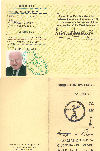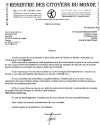Why become a World Citizen?
Find out more about the World Citizen movement and how you become a World Citizen (opens new window)
Click on the images below to see what a World Citizen card looks like
 World Citizen card in English,
World Citizen card in English,  World Citizen card in French
World Citizen card in French  Letter in French that comes with the card
Letter in French that comes with the cardLines on maps are entirely arbitrary. Very few national frontiers are a consequence of geography; most are a result of war or of a political carve up. The borders of African countries, and the reason that they have so many straight lines and bits apparently randomly attached, is because they were determined by the European powers at the Berlin Conference of 1884. Consequently, for instance, Belgium and Britain divided up the valuable copper field in Central Africa between Congo and Zambia. With scarce an exception, today's African countries still support these colonial borders, even though they often split natural ethnic communities and provoke civil wars.
Even in Western Europe hardly a single country has had the same borders for the past hundred years. Certainly the United Kingdom hasn't, given that Ireland was partitioned in 1920. The imposition of a single language has often been the tool used by an imperial power to impose its hegemony. In France, for instance, less than half the population spoke French in 1900 but gradually it was forced upon all the provinces as the medium of teaching, just as English was in Wales. Now, with the diminution of borders within the European Union, and with different perceptions of the importance of identity, regional languages, such as Occitan and Catalan, are being encouraged, as is Welsh.
The idea of sovereignty as we now know it is a relatively modern concept. Before the late Victorian era "nations" existed but were much looser federations. For instance, Germany did not exist as a single "nation" before 1871 and Italy was not unified until 1870. Within a short time, however, politicians began using concepts of nationalism to whip up xenophobia against potential enemies and the idea of "territorial integrity" was developed to justify invasion and even ethnic cleansing. The Balkans descended into disastrous ethnic wars in the name of nationalism soon after the federal structure of Yugoslavia collapsed.
More recently Georgia moved troops into South Ossetia - a small dissident region of around 75,000 inhabitants - which had had a de facto autonomy for over fifteen years, on the grounds that the line on the map suggested that it was within Georgia's "sovereign territory." Russia had been awaiting an excuse to move troops into the area and duly despatched Georgia's puny forces with a significant loss of civilian life. Russia may well now incorporate South Ossetia de facto into Russia's "sovereign territory." What went on was appalling, and there was no excuse for either side to use military force, but to invest borders which are an accident of history with the description of "sovereign territory" is to provide Presidents with the cynical language of a false patriotism, with all its attendant dangers.
This concept of sovereignty is a dangerous myth. It inflames a false patriotic ardour which all too often leads to war. Even worse is the ease with which whole swathes of people can be whipped up into a nationalistic fervour against neighbours or minorities, such as the Germans in the 1930s, and the Serbs and Albanians in Kosovo more recently. It is even more cynical when it is applied to distant territorial possessions. Why is it apparently legitimate to defend militarily 2,400 Falkland Islanders, colonists since 1833, but, at the same time, equally legitimate to force 3,000 native Chagos islanders off the island of Diego Garcia in the Indian Ocean in order to hand it to the Americans for them to use it as an air force base?
The late Rabbi Hugo Gryn, himself a holocaust survivor, told a wry anecdote to demonstrate the absurdity of nationalism:
A man from Berehovo/Bergszasz arrives in heaven and they say to him that before you can come in you have to tell us your life story. "Well", he says, "I was born in the Austro-Hungarian Empire, educated in Czechoslovakia, started work in Hungary and was for a time in Germany, spent most of my adult life in the Soviet Union and the end of my retirement, just before coming here, in the Ukranian Republic." "My goodness," they said, "You must have done a lot of travelling in your lifetime.""Not at all," says the man, "I never left Berehovo."
For most of us our innate feelings of "belonging" are much more local than any engineered nationalism. It is the shared day-to-day life of the neighbourhood or, beyond that, the town or city with which we interact, rather than the country. Even when, as in Yorkshire, there is a fierce sense of identity with a region, it is, in reality, deeply felt over only part of it, such as the West Riding rather than with, say, the North Riding town of Middlesbrough. "Community" is a very subjective concept, varying, for instance, with the level of urbanism, but it is an instinctive feeling rather than an imposed rule.
I am sure that the people of Esher in the county of Surrey are perfectly pleasant, but I have no instinctive feeling of solidarity with them simply as an English town compared with my immediate sense of identity found with liberally minded people I meet in the most unlikely circumstances of towns and cities in Asia or Africa. Compare this, for instance, with the curious example of football where supporters of a town team demand that the club - or rather the limited company that pretends to be a "club" - buys better players from anywhere in the world in the hope that the local "brand" will have success, even if there isn't a single player from the town.
From the individual's point of view, where he or she is born is a complete accident. His or her nationality is almost invariably determined by the geographic chance of place of birth. How, then, in logic, can this implant a national feeling of identity, as opposed to simply an entitlement to a passport which, as yet, has to come from a recognised country? In fact, whenever there are claims to "Englishness" or to an English nationalism, the definition appears only to include white residents of England and not those many citizens whose backgrounds lie in Africa or Asia. And Britain? Since when have the Scots, the Welsh and the (Northern) Irish united to parade their Britishness?
Rivalry between Leeds and Bradford, or between Lancashire and Yorkshire, or even between the North and South of England, may well be passionate but it hasn't led to armed conflict for four hundred years. On the other hand, rivalry between France and Germany led to three wars in seventy years. The European Union, by binding together twenty-seven disparate countries has, in effect, abolished war in Western Europe. The federal entity holds the different countries and different regional entities in balance. It enables Catalonia to recover its identity, it enables regional languages to assert their pride, it assures stability and democracy in countries like Spain, Portugal and Greece which thirty brief years ago were under authoritarian rule. It even means that the internal division of Belgium between Flemish and Walloon people is not driven by violence, however painful the political process may be. Compare the wars between Balkan countries once the federal state of Yugoslavia collapsed. The lines on the European map have faded bit by bit and today one can drive from Lapland to the edge of Gibraltar, or to the Turkish border, without having to show a passport. The EU is the most amazing political creation of the twentieth century.
The Liberal Party constitution, adopted in the fraught international atmosphere of the 1930s, contains the startling phrase: "[The Liberal Party] looks forward to a world in which all peoples live together in peace under an effective and democratically constituted World Authority." That is still my view and, I believe, the aim towards which all internationalists must continue to strive.
One small way in which each of us can demonstrate our commitment is to carry the "World Citizen" card and to show it whenever and wherever possible.
